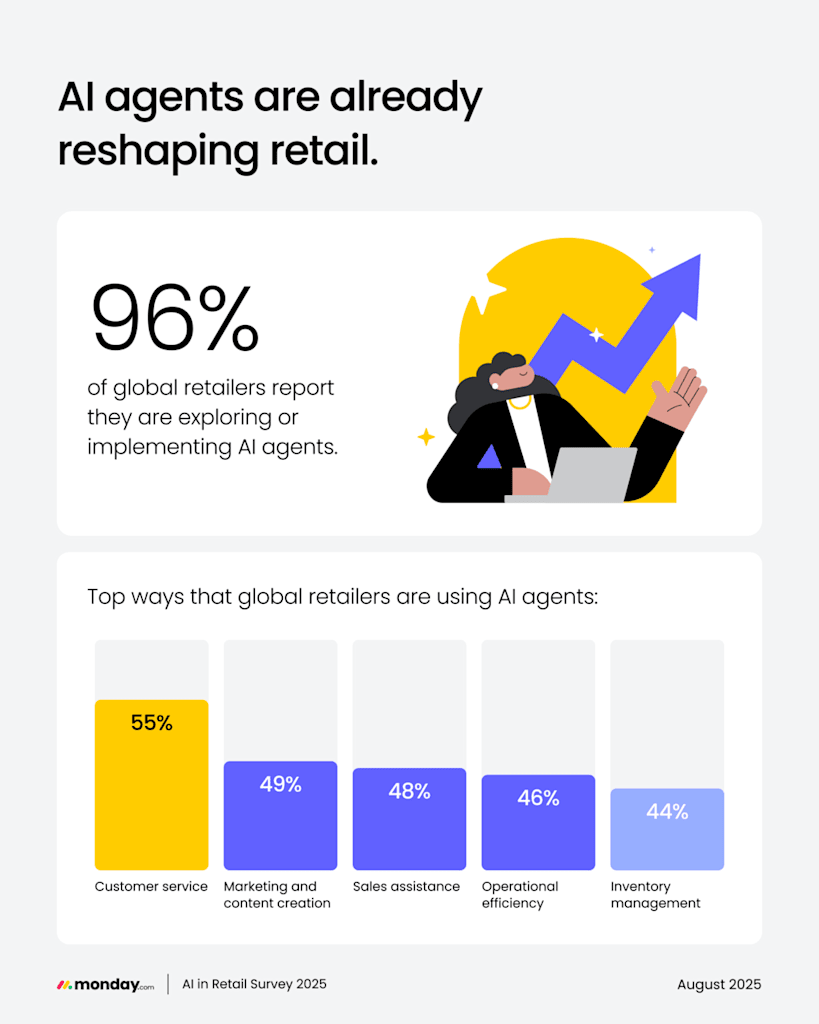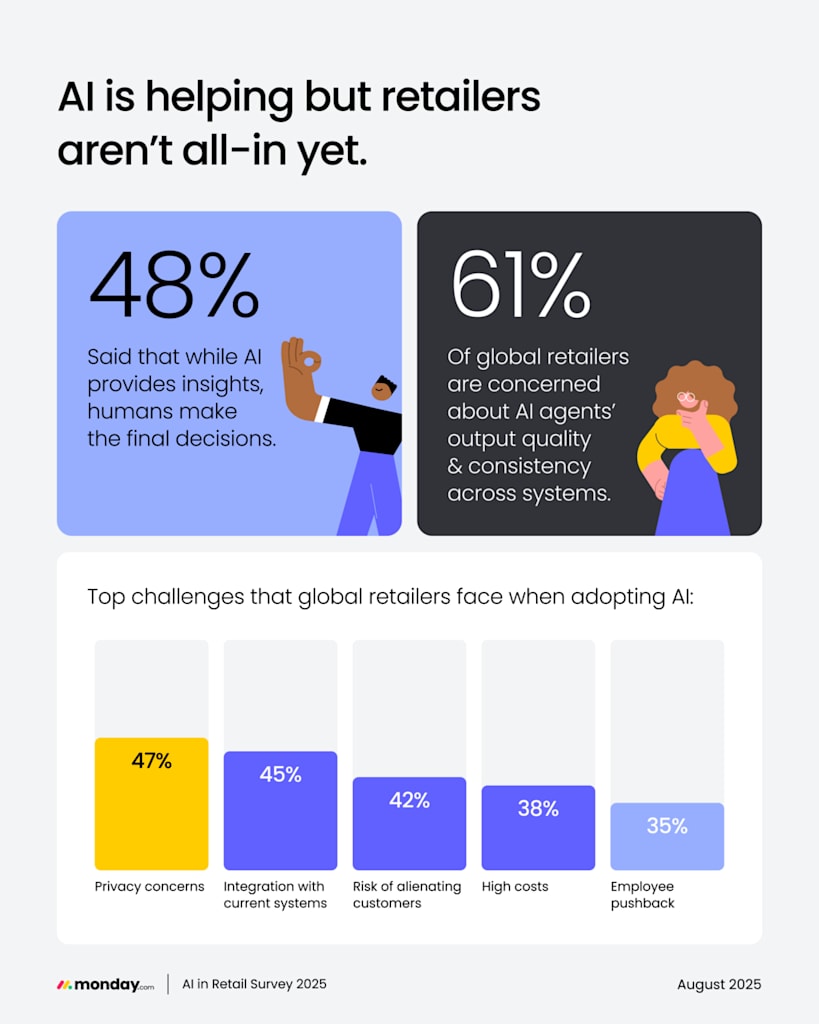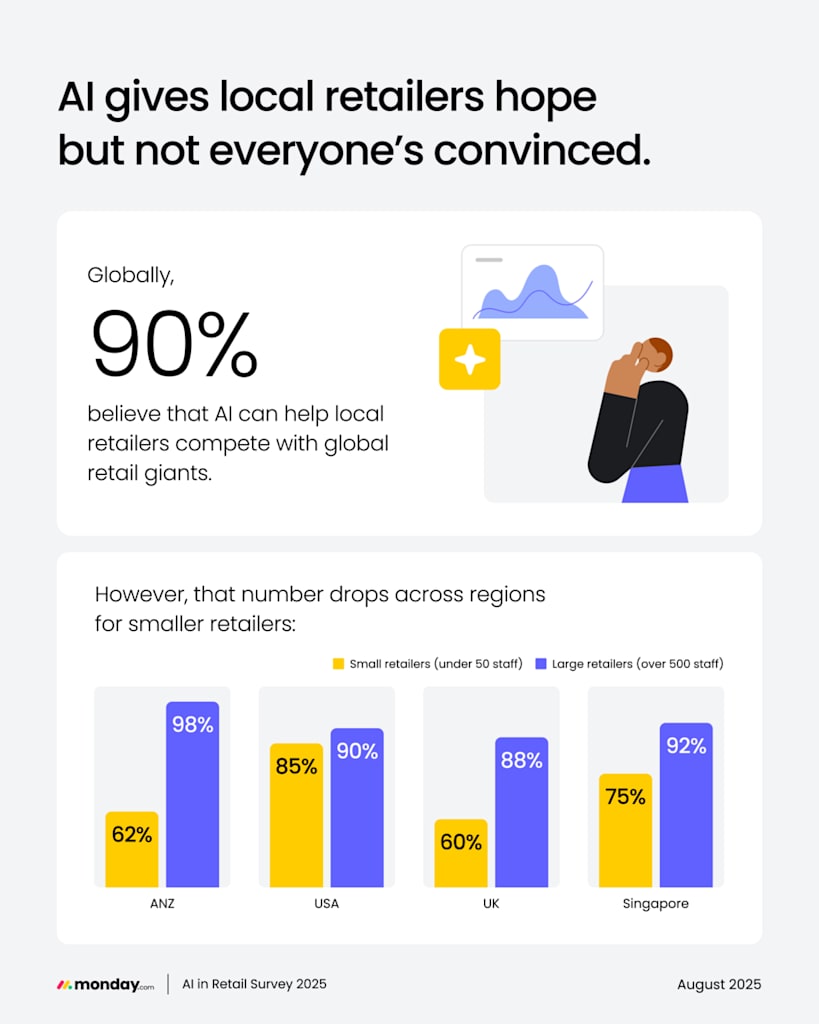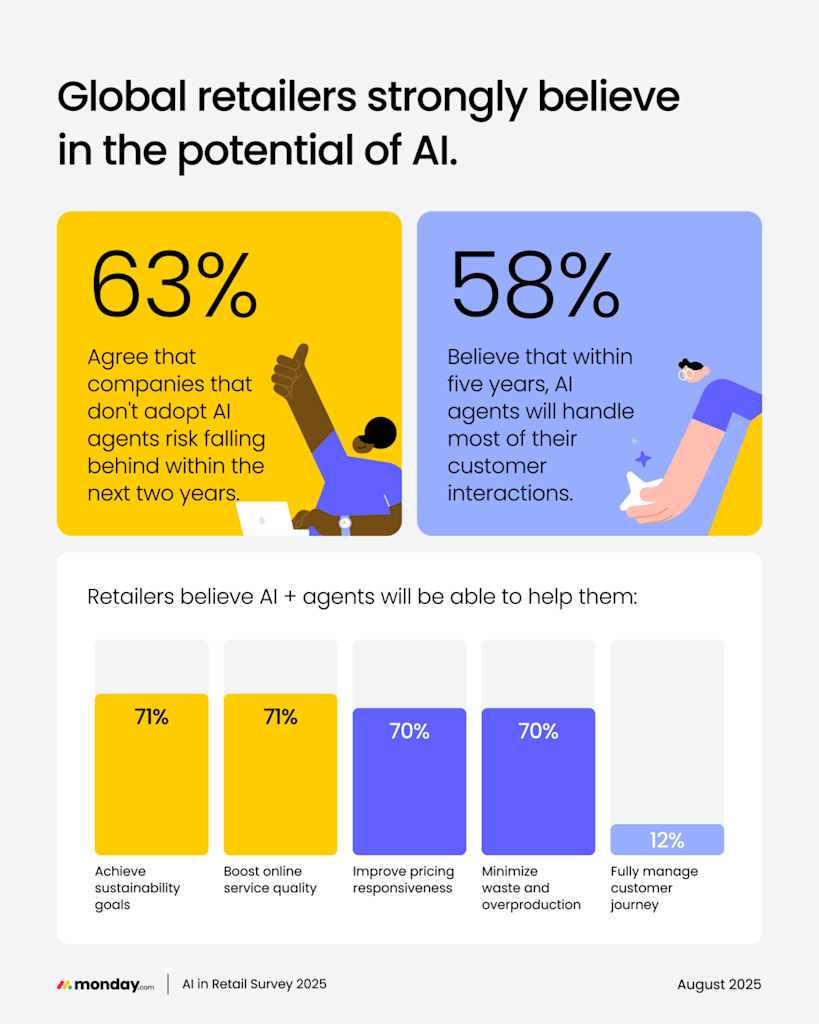New global research reveals how retailers are embracing AI agents — and why trust, cost, and capability remain key barriers to full-scale adoption.
Nearly every retailer globally is racing to adopt AI and agents to elevate customer service, streamline operations, and stay competitive in a fast-changing environment. However, retailers still view human input as an essential part of AI adoption, and are looking for AI that collaborates, not controls.
This striking contradiction, revealed in monday.com’s latest research that surveyed over 1,800 retail leaders across Australia and New Zealand (ANZ), the United States (US), the United Kingdom (UK), and Singapore, exposes the complex reality behind retail’s AI revolution. Despite excitement around the technology’s potential, most retailers are proceeding cautiously — balancing optimism with realism and innovation with human oversight.
Dive into key findings below.
Retailers are moving beyond AI experiments to full-scale integration
Across the globe, a staggering 96% of retail leaders are already implementing, piloting, or researching AI agents to streamline their business operations, from product recommendations to automated fulfilment. This holds true across individual regions:
- US – 98% adoption
- ANZ – 99% adoption
- Singapore – 100% adoption
- UK – 90% adoption
The findings also show retailers have moved beyond AI ambition to action, and the technology is making a real impact across entire organizations. The top business areas where global retailers currently see the most value are:
- Customer service — 55%
- Marketing and content creation — 49%
- Sales assistance — 48%
- Operational efficiency — 46%
- Inventory management — 44%
From real-time product recommendations and conversational commerce, to demand forecasting and automated fulfilment, AI is helping teams respond faster, personalize better, and work smarter.
What’s emerging is a clear trend: retailers aren’t just adopting AI, they’re embedding it into the fabric of their operations to unlock scale, speed, and insight.
Trust issues and implementation challenges remain
Despite widespread adoption, many retailers remain hesitant to grant AI full autonomy. 48% say humans still make the final decisions based on AI input, while 61% express concerns about the consistency and quality of AI-generated output. And only 12% of global respondents believe AI will be able to manage the entire customer journey without human input.
The top challenges to AI adoption globally reflect both technical and cultural hurdles:
- Privacy and data concerns – 47%
- Integration complexity – 45%
- Risk of alienating customers– 42%
- High implementation costs – 38%
- Employee pushback – 35%
In Singapore, for instance, local teams are moving quickly on AI, but stress the need for better integration with legacy systems. In the UK, meanwhile, AI is embedded in strategy, but concerns remain around customer trust and team alignment.
These findings reinforce a key point: AI works best in partnership with people. Rather than aiming to replace human input, retailers are seeking tools that empower their teams and enhance decision-making.
Not all retailers have equal access to AI’s potential
A major finding from the research is the widening gap between larger and smaller retailers.
Globally, 90% agree that AI can help local and independent businesses compete with major retail giants. But when we break this down by business size, the optimism falters, with only 67% of small retailers (less than 50 staff) believing AI can help them compete.
Insights from ANZ suggest the gap is not due to a lack of ambition; smaller retailers are eager to adopt AI but are being priced out by complexity, cost, and a shortage of internal expertise. This pattern holds globally. In the US, large retailers have surged ahead, with 98% saying AI is already embedded in their daily operations, while smaller retailers struggle to match that pace without dedicated tech teams. Similarly, in the UK, smaller businesses are keen but cautious, citing concerns around customer trust and internal alignment.
Ultimately, across regions, there’s a clear need for more accessible, scalable AI solutions that empower smaller players to compete, without over-reliance on high-cost specialists or custom integrations.
Retailers want AI that collaborates, not controls
There’s a strong belief in AI’s long-term potential to transform retail operations. 63% of retailers agree that businesses that don’t adopt AI agents in the next two years risk falling behind, while 58% believe most customer interactions will be handled by AI within five years.
Retailers also see AI as a key driver of sustainability and operational improvements:
- 71% say AI will help achieve environmental goals
- 71% expect it to boost online service quality
- 70% believe it will reduce overproduction and waste
- 70% anticipate improved pricing responsiveness
AI is not replacing the retail workforce. It’s redefining roles and augmenting capabilities. Whether supporting sustainability efforts or personalising shopper experiences at scale, retailers are clear: they want AI agents that empower human decision-making, not override it.
Final takeaway: AI’s retail evolution is human-guided
The future of AI in retail is about enabling teams rather than replacing them. Retail leaders are aligned: AI is now essential to competitiveness, efficiency, and innovation. But its true power lies in collaboration, not control.
At monday.com, we believe tools should make AI adoption easy, transparent, and accessible, no matter your team size or technical background. Our multi-product platform helps retail teams across regions turn AI-powered insights into action, without complexity getting in the way.
Because when AI works with people — not in place of them — the whole team moves faster, smarter, and more confidently.




